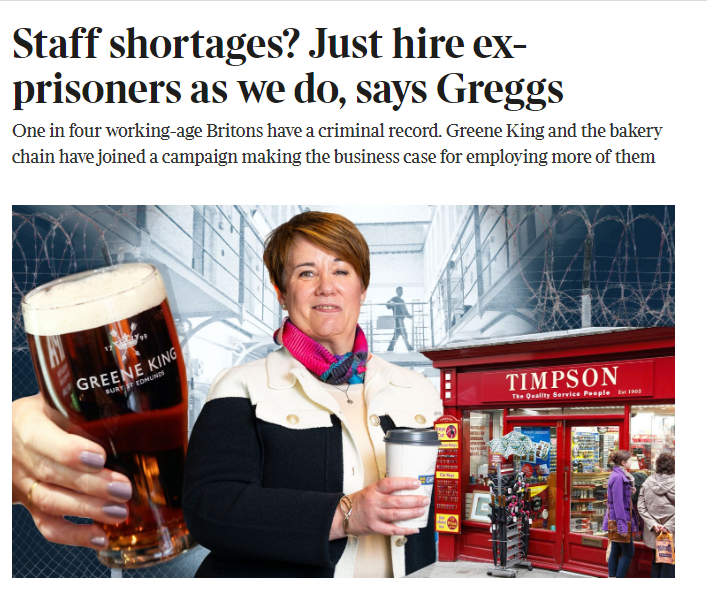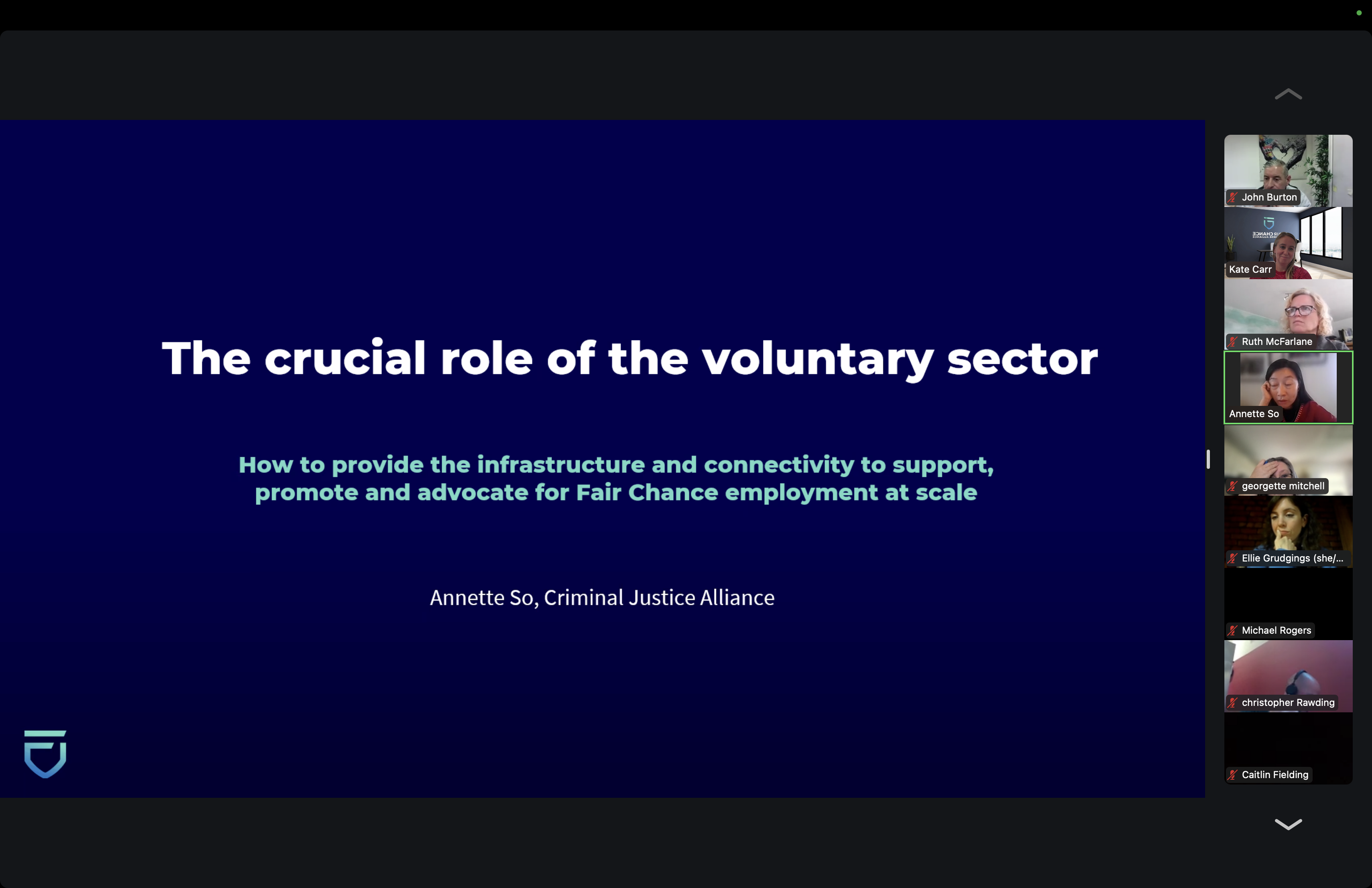
Getting Started
Getting Started

Taking the first step
So, you’re thinking of employing people with convictions, but you’re not sure quite where to begin. Or not entirely sure you should.
Well, we’ve addressed some of the common myths HERE.
As the Alliance grows, we’ll create our own library of resources, in partnership with friends and allies from the commercial and third sectors, to guide employers through every step they need to take to address each tier of our Fair Chance Charter. But for now, here are our thoughts (below) on the most important principles you’ll want to think about, with links to some of our favourite advice from experts already doing great work in this field.

Fair Chance Principles
Our friends at Unlock researched and devised eight Fair Chance principles for hiring people with convictions. Here’s our short summary version – but for chapter and verse you’ll want to visit their website, where explain how and why each one matters.
Note: All of the information about the law applies to England and Wales only – provisions in Scotland and Northern Ireland are often similar but sometimes vary.
Do you need to know about an applicant’s criminal record? Why? It’s sometimes legally necessary, but mostly not, and if it isn’t relevant, why do you need to know
If your risk management process says you do need to collect criminal record information, you’ll need to evidence why, have a written policy, and follow the law. The Data Protection Act (2018) and the Rehabilitation of Offenders Act (1974) or ROA and the Police Act (1997), are all key pieces of legislation.
Data protection law requires that you collect no more personal data than is necessary. If you’re not going to hire someone, you don’t need to know – so at what point in your recruitment process to ask? See Ban The Box.
The rules around disclosure are complicated. Be clear and precise – for both HR and the applicant – about what information you do and don’t need. Under the ROA, there may be information the law does not allow you to know.
Decisions you make about disclosure, including how you record and manage applicant information, must be documented, well understood and applied. Don’t “copy and paste it” – write your own Criminal records policy.
If you require disclosure for a role, give the candidate the chance to explain their record in their own words. This also provides an opportunity for you to ask specific, relevant questions based on their disclosure and address any discrepancies between their disclosure and a DBS report.
Keep a record of the recruitment process, including clear notes on how, if at all, a disclosure affected a hiring decision.
Training for HR staff, and wider awareness for colleagues, is essential to protect you, your team and your new applicant. It’s one of the reasons why we started the Alliance!
Fair Chance Principles © Unlock
Other useful resources
It starts at the top. If you want to hire and promote people with criminal records, you need to have a serious conversation with your HR team, and you’ll need to listen as well as talk. There are fears and anxieties around hiring people who’ve offended, and most of them are based on media stereotypes not direct experience. But you’ll need to make the case for why this is worth doing for your organisation, bust some myths, and take people with you. You’ll also need to rewrite your policies and practices around recruitment so that criminal record information from candidates is handled consistently, lawfully and sensitively.
Business In The Community sets out the business case for hiring people with convictions.
The Exceptionals have an excellent slideshow on their website that summarises the case in favour, as a well as a one-page guide.
The business leaders’ magazine, Raconteur, explores the case for hiring people with convictions.
Unlock provides guidance on how to create a policy for applicants with a criminal record that complies with the law and meets the needs of your own organisation.
Ban The Box is a Business In The Community [https://www.bitc.org.uk/post_tag/ban-the-box/] initiative that calls for the criminal record ‘tick box’ to be removed from application forms.
Working Chance’s Hiring With Conviction offers a complete guide to recruiting and supporting people with convictions. And their report on Progress and Prejudice provides an up-to-date picture of employer attitudes – good and less so – in this area.
The government’s New Futures Network has published a guide to hiring prison-leavers and other people with convictions.
Raconteur: Could hiring ex-offenders offer a solution to the recruitment crisis?
HR magazine: Most employers would consider hiring ex-offenders in 2023
The Daily Telegraph: From jail to job: why more companies are hiring ex-offenders
The Guardian: After the crime: why employers should give ex-offenders a working chance
Harvard Business Review: Give Job Applicants with Criminal Records a Fair Chance
There are employers who engage in completely open hiring for most or all positions – which means they never ask about criminal records. And all power to them, we say.
But we assume that most of our Alliance members will have at least some jobs where knowing about a criminal record may be relevant to their hiring decision. At the Fair Chance Business Alliance, we support a risk-management approach to every vacancy.
It’s a fundamental Fair Chance principle that we don’t ask unless/until we have to – which means during an interview at the earliest, or during a conditional offer conversation. But how do you manage that conversation? And how do weigh what you learn against the specific job opportunity you’re interviewing for? That needs thinking about and training for.
Nacro has some great information for employers facing this for the first time. |
Unlock’s Guide to Insurance explodes some common myths that can worry employers who want to hire people with convictions.
The Exceptionals have a simple 10-step summary guide.
Nacro’s guides to asking about criminal records and evaluating disclosures are very thorough, although they don’t cover risk-assessing the vacant role itself.
The Rehabilitation of Offenders Act, The Data Protection Act (GDPR) and the rules around the Disclosure and Barring Service are sometimes complex, unfortunately – and often misunderstood as a result. Some of them are also in the process of changing. We’re not lawyers, but we know some great people who are. Here are our favourite resources.
ROA Guidance from the Government
Unlock’s guide to the Rehabilitation of Offenders Act
Nacro has a poster that simplifies the rules around when a sentence is ‘spent’ and protected by the ROA.
Data Protection Guidance from the Government
Unlock’s Guide to Data Protection in the UK
Unlock’s Guide to the Police Act
Criminal Record Guidance from the Government.
Unlock’s guide to Criminal Record Checks sets out in plain English what you are and aren’t allowed to know and ask for.
Nacro’s information about Criminal Record Checks is extremely comprehensive, and they publish an even more thorough, 14-page guide.
For most roles, once a conviction is ‘spent’ it no longer has to be disclosed – but when and how this applies is complicated. These tools may help
The government’s calculator.
Fair Chance Principles © Unlock
It’s no good having great policies if no one’s applying. If you want to actively attract these candidates you’ll need to go public, which means thinking about how you write your job adverts and recruitment policies, identifying partner organisations that can help you source job-ready applicants, and placing your vacancies on platforms where people with criminal records will see them.
The government’s programme for prison-leaver employment, the New Futures Network is keen to hear from businesses ready to take them.
The Exceptionals has some great ideas on connecting with candidates, especially if you’re interested in working with prison-leavers.
All of the following organisations provide expert support to employers who want to start hiring people with convictions.
A Charity that works with people with criminal records and employers; the founders of our Fair Chance principles.
Formerly the National Association for the Care and Resettlement of Offenders, Nacro works with people with convictions and employers, providing consultancy and training services.
A place where employers who are open to applications from people with convictions can promote their vacancies
The business-community outreach charity is the home of Ban The Box and the broader Opening Doors campaign.
Latest News

FCBA Welcomes ReGenerate’s Midlands Employer Alliance: A Bold Step Towards Inclusive Hiring
We are thrilled to celebrate the launch of ReGenerate’s Midlands Employer Alliance, a forward-thinking initiative aimed at fostering more inclusive hiring practices across the Midlands region. As a partner in the ongoing mission to break down employment barriers for individuals

Fair Chance Webinar, hosted by Clinks
A brilliant hour this afternoon spent hearing from a range of experts from the criminal justice sector on the critical issue of fair chance employment in the UK and how the Fair Chance employment charter provides an innovative and unique

Fair Chance ‘Go Live’: A New Era for Inclusive Hiring Begins
What a brilliant afternoon we had yesterday at our Go Live event – a huge amount of energy and positivity in the room, and a significant step forward in realising the possibilities of the Alliance, not just for all those

